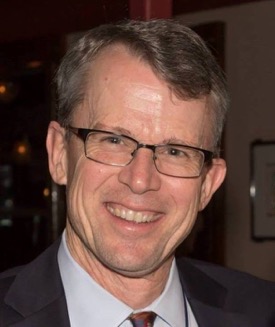.
EDITOR’S NOTE—Since 2007, ReadTheSpirit has covered important new voices in books and films with a focus on cultural and religious diversity. Our audience is global with many of our readers clustered in Canada, the UK, India, Australia and other regions of Europe and Asia. But most of our readers live in the U.S., where an important election is looming. So, we invited columnist Henry Brinton to share a bit of wisdom with us, this week, that may refocus our concerns on the larger vision of our faith traditions.
.
By HENRY G. BRINTON
ReadTheSpirit Contributing Columnist

Americans will be taking their most passionate concerns to the ballot box on November 6. On both sides of the aisle, voters are approaching Election Day with religious fervor.
Two years ago, evangelical voters supported Trump in overwhelming numbers, sometimes overlooking his personal behavior to focus on his promise to promote conservative social beliefs—especially through Supreme Court nominations. Today, progressive religious leaders are getting involved in politics to oppose Trump’s policies on immigration, health care and the environment.
In addition, religiously unaffiliated voters are going to rallies and donating to political causes as well. According to The Atlantic, the voters who are most fired up about the 2018 elections are “Democrats, college-educated, and largely secular.” Politics appears to be “the new religion” for Progressive Democrats.
Supreme Court nominations, immigration, health care, and the environment—all are serious concerns, to be sure. But should any of these be ultimate concerns? Should politics ever become—for people of faith or no faith—a “new religion”?
For the Protestant theologian Paul Tillich, “faith is the state of being ultimately concerned.” The “ultimate” is the thing that demands our complete surrender, and for some people this will be politics or money or sex or success. But for Jews, Christians and Muslims, the ultimate is God, the one who is most important and most real. Our faith in God is what Tillich calls “the act of unconditional, infinite and ultimate concern.”
In my reading of the New Testament, I see that Jesus resisted the temptation to have ultimate concern for anything but God. “You cannot serve God and wealth” he said in the Sermon on the Mount (Matthew 6:24). After Pontius Pilate asked him, “Are you the king of the Jews?” he answered, “My kingdom is not from this world” (John 18:33-36). And when people called him good, Jesus said, “No one is good but God alone” (Mark 10:18). Like Tillich, Jesus knew that when things like wealth or political power or even goodness become ultimate, they become false idols.
A challenge for people of faith is to live in “the state of being ultimately concerned.” But this is not a pie-in-the-sky, otherworldly orientation. In fact, this state of ultimate concern often addresses many lesser concerns, because faith can inspire us to build a healthier and more just society. It is no coincidence that the historical social movements that built hospitals, eliminated slavery, and expanded civil rights were all grounded in faith communities. People who have ultimate concern for God are often deeply concerned about making the world a better place.
So what does God want us to do? Our scriptures give us excellent guidance.
God “has told you, O mortal, what is good; and what does the Lord require of you but to do justice, and to love kindness, and to walk humbly with your God?” (Micah 6:8).
“You shall also love the stranger, for you were strangers in the land of Egypt.” (Deuteronomy 10:19).
“The alien who resides with you shall be to you as the citizen among you; you shall love the alien as yourself.” (Leviticus 19:34).
“Thus says the Lord: Act with justice and righteousness, and deliver from the hand of the oppressor anyone who has been robbed. And do no wrong or violence to the alien, the orphan, and the widow, or shed innocent blood in this place.” (Jeremiah 22:3).
“Worship Allah and associate nothing with Him, and to parents do good, and to relatives, orphans, the needy, the near neighbor who is your relative, the neighbor who is not a relative, the companion at your side, the traveler, and those whom your right hands possess.” (Quran 4:36).
Similar teachings run through a host of readings from Eastern religious traditions as well.
I’m convinced that those of us who are people of faith should, indeed, take our concerns to the ballot box on November 6. But as we do, let’s not lose sight of our ultimate concern.
Let’s remember God’s call to act with justice and righteousness—for all.
.
More about Henry
HENRY G. BRINTON is pastor of Fairfax Presbyterian Church in Virginia, and has written on religion and culture for The New York Times, The Washington Post, USA Today, and Huffington Post.
A frequent speaker at workshops and conferences, he is the author or co-author of five books including The Welcoming Congregation: Roots and Fruits of Christian Hospitality.
Married with two adult children, he enjoys boating on the Potomac River and competing in endurance sports such as marathons, triathlons and century bike rides, one of which landed him in the hospital for 11 days.



Dear Henry,
Of course I cannot read this without tears.
But tears provide more space in my mind than
Anger at a conservative point of view for the oppressed
Your writing provides a great Segway from scripture
To the every day experience.
Evangelical? The word seems so tarnished
When I consider the teachings that were learned
Experientially.
Thanks, Norma
Beautifully stated. Matthew 6:24 and Leviticus 19:34 seem particularly appropriate in Trump America.
Well written! Thanks for sharing!
Henry, Welcome aboard as a fellow columnist. You bring a rich, vital perspective so necessary as we read the Bible in one hand and a newspaper in the other. Thank you for this provocative article. I look forward to many more.